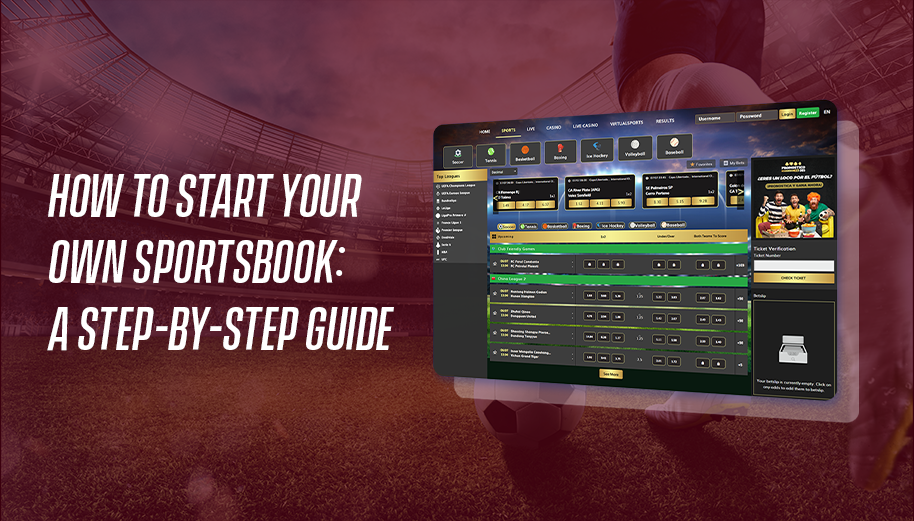Are you looking for an exciting and lucrative business opportunity? Starting your own sportsbook may be the perfect fit. Whether you are a sports fan, have a background in bookkeeping, or just love the challenge of running a business, a sportsbook can be a great investment. This guide will walk you through everything you need to know to get started, including where to find the best technology and software, how to maximize your profits, and what to look out for when setting up shop. Read on to find out more.
Table of Contents:
I. Introduction
II. Steps to Starting Your Sportsbook
A. Identifying the Right Sportsbook Software
B. Sourcing Suppliers
C. Understanding the Legality
D. Assessing the Financials
E. Deciding on a Business Model
III. Maximizing Your Profits
A. Developing an Effective Promotional Strategy
B. Utilizing Analytics to Track Performance
C. Establishing a Bonus and Rewards Program
D. Leveraging Technology to Automate Processes
IV. Conclusion
I. Introduction
This guide is for anyone looking to start their own sportsbook. It will explore the legal and financial considerations of starting a sportsbook, identify the best software and suppliers for your needs, and discover the best practices for optimizing revenue, including expert advice on maximizing profits.
II. Steps to Starting Your Sportsbook
A. Identifying the Right Sportsbook Software
Finding the Right Sportsbook Software is key to running a successful sportsbook. It is important to do your research on what available software solutions there are on the market that will meet your needs. Different software packages offer different levels of features and functions, so it is important to make sure you are getting the best option for your business. Additionally, make sure that the sportsbook software you select is compatible with the various devices you plan to use.
B. Sourcing Suppliers
After selecting the software you plan to use, you will need to find suppliers who can provide the technology and equipment your sportsbook needs to operate. This includes items such as computers, monitors, video walls, and other hardware. When comparing suppliers, pay attention to cost, delivery time, and quality. Additionally, make sure the supplier is reliable and can provide on-site technical support if needed.
C. Understanding the Legality
Before getting started with setting up your sportsbook, it is important to understand the legal requirements. Gambling laws vary from one jurisdiction to another, so it is important to make sure you are in compliance with local, state, and federal laws. Additionally, most states have specific regulations that must be followed when it comes to sports betting, so do your due diligence to make sure you are following the rules.
D. Assessing the Financials
As with any business, it is important to assess the financials of starting your own sportsbook. This will include costs such as start-up and operational expenses, taxes, marketing, employee salaries, and other costs associated with running a business. It is important to understand your budget before getting started.
E. Deciding on a Business Model
Finally, you will need to decide on a business model for your sportsbook. This will include factors such as what types of bets you will offer, your pricing structure, and the types of promotions you will have. Additionally, you will need to come up with a plan for collecting payments from customers and making payouts. All of these factors will need to be taken into consideration before opening Your Sportsbook for Business.
III. Maximizing Your Profits
A. Developing an Effective Promotional Strategy
In order to maximize your profits, it is important to develop an effective promotional strategy for your sportsbook. This will include tactics such as identifying target markets, leveraging customer data, and creating compelling campaigns. Additionally, you should make sure your sportsbook is seen online by optimizing your website and utilizing social media marketing.
B. Utilizing Analytics to Track Performance
Analytics is an important tool in understanding how your sportsbook is performing. Using data to track customer behavior, transactions, and trends can help you identify areas for improvement and opportunities for growth. Additionally, analytics can help you understand your competitors and market, allowing you to adapt your strategy for success.
C. Establishing a Bonus and Rewards Program
In order to keep customers coming back, it is important to establish a bonus and rewards program for your sportsbook. This can include things such as free bets, discounts, or loyalty bonuses. Having a great bonus and rewards program is an effective way to drive customers and keep them coming back for more.
D. Leveraging Technology to Automate Processes
Finally, leveraging technology to automate processes can help you maximize profits and make your business more efficient. From automated payments to marketing automation, leveraging the right technology can save you time, money, and effort in the long run. Additionally, leveraging technology can help you create a better customer experience, ensuring your customers are happy and coming back for more.
IV. Conclusion
Starting your own sportsbook can be a great business opportunity, but there are a lot of considerations that must be taken into account. This guide has explored the different steps involved in setting up a sportsbook, including identifying the right software and suppliers, understanding the legality of sports betting, assessing the financials, and deciding on a business model. Additionally, it has discussed best practices for maximizing profits, such as developing an effective promotional strategy, utilizing analytics to track performance, establishing a bonus and rewards program, and leveraging technology to automate processes. With this ultimate guide in hand, you will be well on your way to running a successful sportsbook.






Comments